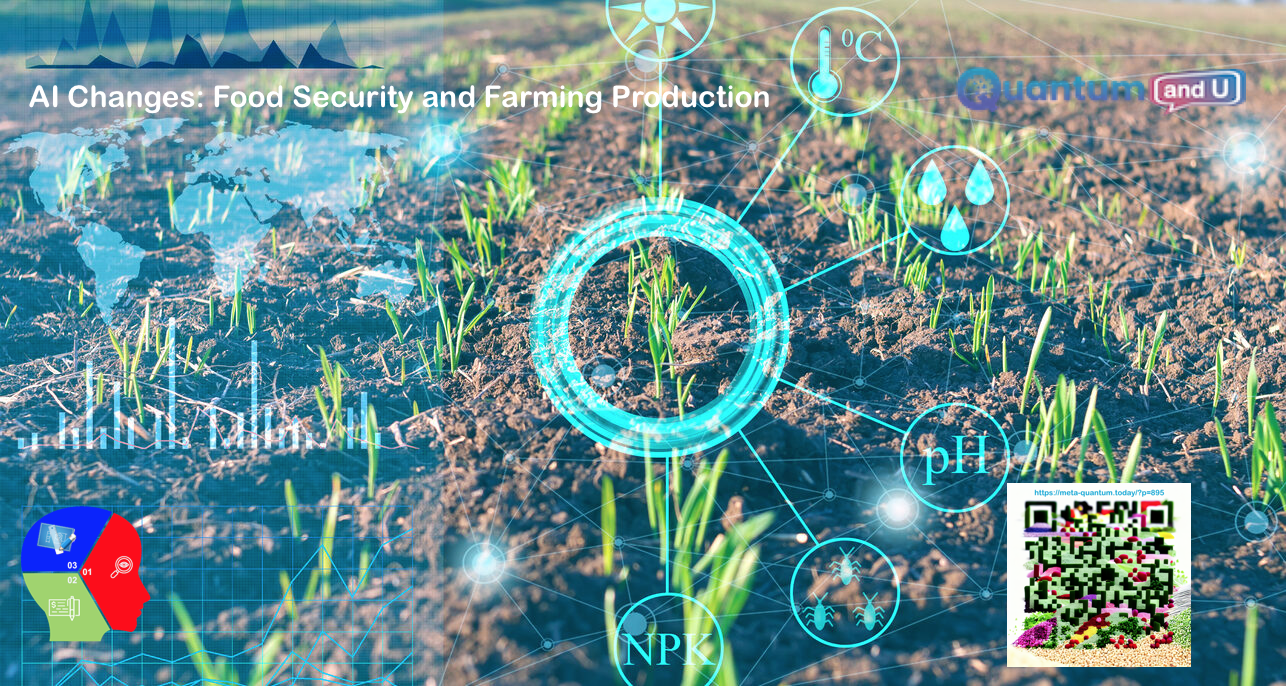
Introduction:
The YouTube video review delves into the transformative impact of artificial intelligence (AI) in the agricultural sector, with a specific emphasis on its role in bolstering food security and farm production. It underscores AI’s role in magnifying productivity and fortifying food security globally. The video demystifies AI as a technology proficient in learning, reasoning, and self-correction, becoming an indispensable tool in contemporary farming. It also elucidates food security as the accessibility and availability of food. The review explores how AI is refining farming practices, enhancing efficiency. It cites real-world instances of AI-integrated machines undertaking tasks like planting, weeding, and harvesting, thereby amplifying productivity and crop yield via precision farming. It further unravels AI-driven precision farming, which meticulously optimizes resource allocation and heightens crop yields while mitigating environmental impact. Such AI-based tools are utilized in analyzing soil composition, weather patterns, crop health, and forecasting potential hazards. The video also delves into predictive analytics, a facet of AI, utilized to forecast crop yields, market demand, and pricing trends, thereby enabling farmers to make knowledgeable decisions regarding crop management. Moreover, it highlights the significance of automated monitoring in farming via AI-enabled drones and sensors, capturing real-time information on soil hydration, temperature, and crop health. This data-oriented strategy fosters swift issue identification and strategic decision making. The video further mentions the deployment of AI-facilitated robots in tasks like fruit picking, cattle milking, and crop pollination. The review concludes by emphasizing the criticality of data-oriented decision making in farming, asserting that the integration of AI-empowered precision farming, predictive analytics, automated monitoring, robotics, and data-driven decision-making is essential for superior farming practices. It posits that the incorporation of AI in farming is crucial for a sustainable and efficient food production system, considering the burgeoning global population.
Related Sections:
- Precision Farming and Predictive Analytics: AI-powered precision farming utilizes sensors, drones, and satellites to collect real-time data about crops and soil health. AI algorithms process this data to provide detailed analysis, allowing farmers to make informed decisions, optimize farming practices, increase yields, and reduce risks.
- Automated Monitoring and Robotics: AI-driven automation has made farming tasks more efficient and less labor-intensive. Autonomous robots work tirelessly in fields, planting seeds, harvesting crops, and controlling weeds with precision and speed. AI-powered monitoring systems keep a constant watch on crops, livestock, and equipment, enabling early disease detection and ensuring overall farm health.
- Data-Driven Decision-Making: AI helps farmers make the most of data by integrating information from various sources, such as weather patterns and soil composition. AI algorithms analyze this wealth of data to provide valuable insights, leading to data-driven decisions on planting schedules, resource allocation, and crop management.
- Crop and Soil Management: AI analyzes soil data and recommends precise fertilization plans, ensuring crops receive the right nutrients. By closely monitoring crops, AI can detect signs of stress, diseases, and nutrient deficiencies early on, enabling timely action and preventing potential crop losses. AI also aids in weed and pest management, promoting sustainable farming practices.
- Water Management: AI-driven smart irrigation systems monitor soil moisture levels and weather conditions in real-time, delivering the precise amount of water needed by crops. This minimizes water waste, improves water use efficiency, and helps conserve water resources.
- Crop Yield Prediction and Quality Control: AI accurately predicts crop yields by analyzing data such as weather conditions and soil health, enabling farmers to plan logistics, storage, and market strategies. AI algorithms also assist in quality control by identifying and sorting produce based on various parameters, ensuring high-quality crops reach the market.
- Collaborative Farming and Knowledge Sharing: AI-powered online platforms facilitate communication among farmers, allowing them to exchange insights, best practices, and market information. This collaborative approach fosters a sense of community and collective intelligence, promoting sustainable and efficient farming methods.
- Farm Resource Optimization: AI optimizes farm resources by analyzing data on weather patterns, soil conditions, and crop growth. AI algorithms suggest the most efficient use of resources such as water, fertilizers, and energy, reducing costs and minimizing environmental impact.
Conclusion:
AI is truly revolutionizing agriculture by enhancing farming practices, increasing productivity, and ensuring food security. By embracing AI technologies and leveraging their benefits, farmers can build a sustainable and efficient food production system to meet the challenges of a growing global population. Collaborative efforts and knowledge sharing are essential in this process. Embracing the potential of AI in agriculture can lead to a more productive, resilient, and food-secure future.
Key Takeaway Points:
- AI-powered precision farming and predictive analytics help farmers make informed decisions, optimize practices, and reduce risks.
- Automation and robotics improve farming efficiency and reduce labor-intensive tasks.
- Data-driven decision-making enhances productivity and reduces waste in farming.
- AI aids in crop and soil management, water management, and quality control, promoting sustainable practices.
- Collaborative farming and knowledge sharing foster a sense of community and collective intelligence.
- Farm resource optimization through AI leads to better resource efficiency and sustainability.
- AI in disease and pest management results in targeted and ecological approaches.
- Embracing AI in agriculture can build a sustainable and food-secure future.


